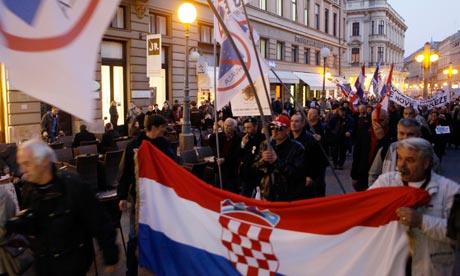Bosnia
Hope in Bosnia-Herzegovina revolt; Graphic new doco on wave of people's power
Documentary: Bosnia and Herzegovina in Spring, March 2014.
Bosnia-Herzegovina: Tuzla -- the unknown workers' capital of Europe

Hundreds participate in the democratic plenums.
By Olivier Besancenot
Bosnia’s magnificent uprising: Heralding a new era of class politics?

Mass protest in Tuzla, February 7, 2014.

Protesters rally during anti-government protest in Zagreb, Croatia, March 2011. Photograph: Darko Bandic/AP.
[Links International Journal of Socialist Renewal urges its readers to consider taking out a subscription to Monthly Review, where this article first appeared.]
By Srećko Horvat and Igor Štiks
Left debates Libya: Imperialist nature of war is now clearer

Aftermath of a NATO airstrike on Tripoli.
[For more left views on Libya, click HERE for articles and associated comments.]
By Michael Karadjis
June 23, 2011 -- Links International Journal of Socialist Renewal -- Renfrey Clarke has written a very detailed and thoughtful piece of discussion, and despite my disagreement with it, I welcome the fact that people are willing to put forward unpopular positions (among the left) and have them thrashed out, especially when it is done in such a careful and thorough way.

Skulls of victims of one of the massacres during the 1994 Rwandan genocide are displayed at the Genocid
Serbia: The war criminal Karadzic and Western hypocrisy
By Michael Karadjis
August 2, 2008 (updated October 11, 2008) -- The new Serbian government last month finally cornered Radovan Karadzic, the former leader of the Bosnian Serb Republic (Republika Srpska), one of the two entities which make up Bosnia, during the war in 1992-5 when that statelet was created. Karadzic had been in hiding for many years from the International War Crimes Tribunal in, which in 1995 had indicted him for various war crimes including genocide.
The July 21 arrest led to a wave of hypocrisy in Western capitals, congratulating Serbia on the arrest of the vile criminal. Yet for the last seven years in Afghanistan and five years in Iraq, well upwards of a million people have been killed as a result of the US invasion and occupation of these countries. Whole countries are being destroyed; yet not only do these war crimes of climactic scale go unpunished, but these leading war criminals then see themselves as having the right to designate who is a war criminal.
NATO's Balkan war and the Kosova liberation struggle
By Doug Lorimer
[The general line of this report was adopted by the June 12-14, 1999 DSP National Committee plenum. Text is taken from The Activist, volume 9, number 5, 1999]
On Wednesday March 24, 1999, the secretary-general of NATO, former Spanish social-democratic minister of culture Javier Solana, told a press conference: "I have just given the order to the Supreme Commander of Allied Forces in Europe, United States General Wesley Clark, to begin air operations against the Federal Republic of Yugoslavia."
The following day 371 NATO warplanes undertook bombing raids and six NATO warships in the Adriatic launched cruise missiles against targets in the Federal Republic of Yugoslavia.
Between March 25 and the cessation of NATO bombing raids on June 9, more than 30,000 combat missions had been flown by NATO warplanes against Yugoslavia. Thousands of civilians in Serbia have been killed or wounded. Millions of Serbian workers are now living without electricity, or water, or jobs. Factories, power stations, houses, hospitals, bridges and roads have been destroyed or damaged. The destruction of oil refineries and petrochemical plants have poisoned the air, rivers and soil of Serbia with toxic products. It has been estimated that the reconstruction of damaged or destroyed infrastructure will cost between $US15-50 billion.
Yugoslavia, Washington and the `Balkanisation' of Bolivia
By Michael Karadjis
I feel forced to write to correct some confusion that has been circulating regarding the current US ambassador to Bolivia, Philip Goldberg, who has been supporting the so-called ``autonomy'' referendum by the Bolivian oligarchy.
A continuous line has come out that Goldberg ``has experience in partition'' because he allegedly participated in the dismemberment of Yugoslavia. This tends to be a secondary point alongside a more general point that erroneously compares actual oppressed nations, such as the Kosovar Albanians, the poorest people in Europe, who have striven for independence for over a century, with the rich oligarchy of low-lands Bolivia, engaged in an imperialist-backed destabilisation of the Bolivian revolution.
Along with Kosova, some also list Tibet and other examples of so-called ``secessionism'' as being related to the Bolivian oligarchy's campaign. One feels compelled to add Palestine, Eritrea, Bangladesh, East Timor, Aceh, Tamil Ealam and other national liberation struggles by oppressed peoples just to make it consistent.
